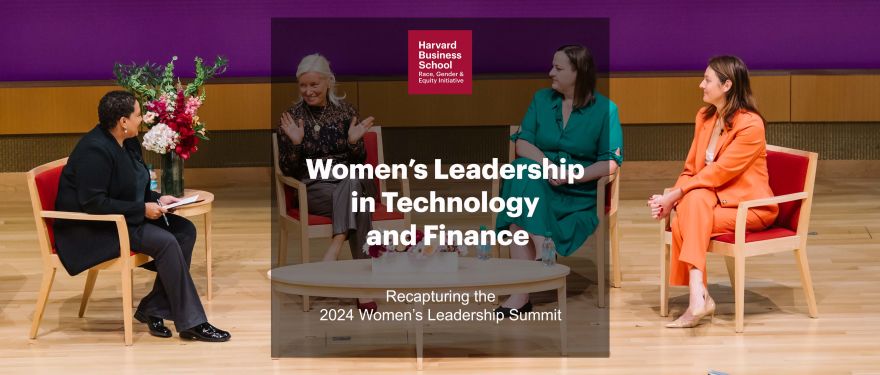In early November, an intergenerational assembly of remarkable women convened at Harvard Business School’s campus for the HBS Women’s Leadership Summit. The two-day gathering drew out insights from alumnae who are at the forefront of today’s most cutting-edge industries. The event was bookended by panels on women’s leadership in technology and finance.
Women’s labor and intellectual contributions undergird the past and future of both technology and money. Yet, the focus of conversations around women in male-dominated industries is often confined to increasing representation. Women are, and always have been, essential to shaping innovation and pioneering tomorrow’s world.
Historical exclusion of women from these important industries did not go unacknowledged, and the panelists shed insight into how women can not only show up, but lead, influence, and innovate in these sectors. The opening panel focused on women leading in technology, moderated by Professor Tsedal Neeley, and featured three women who have served as leading tech entrepreneurs and executives at crucial periods in the industry’s evolution. Carolyn Everson (MBA 1999) served a decade as a VP at Meta (formerly Facebook) alongside Mark Zuckerberg. Leslie Feinzaig (MBA 2007), spent nearly five years at Microsoft before launching a thriving EdTech venture. Now, she runs the Female Founders Alliance, a network of women entrepreneurs, as well as Graham & Walker, a venture capital fund focused on investing in women founders. And Michelle Zatlyn (MBA 2009) co-founded and serves as President and COO of Cloudflare, a cybersecurity and web content delivery.
The panel discussion covered a broad range of topics—from effective leadership to entering tech without a technical background to the AI revolution. The three major takeaways boil down to leading with teamwork and humility, developing a healthy curiosity for new technologies, and building a framework for disruptive technologies (like AI) to become positive labor market forces.
What makes a great leader?
Everson shared her best insights for burgeoning leaders, describing leadership as an exercise in humility.
- Check your ego at the door. Being aware of what you don’t know is as crucial as having confidence in your own skillset.
- Moreover, surround yourself with people who are better than you. Hire people who are smarter than you, who have technical abilities you don’t have, and who have a high emotional quotient with soft skills you aspire to mirror. Doing this will help you raise your company to heights you never could have imagined alone.
- There is no “i” in “team.” Feinzaig and Zatlyn reminded us that no single person can realistically achieve cutting edge innovation or build a great business in isolation. Get comfortable with your peers, both in and out of a workplace setting.
- Learn how to generate ideas and execute them together, leveraging multiple cross-functional skillsets for a greater cause. Find a group of like-minded women (such as through your alumnae network) to build with—the future of work is what you make of it.
You can’t be a tech leader without being a tech user!
Don’t hesitate to pursue that career in tech even if you don’t have a technical background. Everson noted that she’s never written a line of code and yet, still made a significant impact at Meta.
- You do need to understand the user experience. If you join the senior leadership of any given technology company, you must, at minimum, know the product well.
- Experiment and have fun. Make an account and explore the interface of the product or service. Learn what works and make note of what doesn’t. This will ultimately put you at a great advantage when making business decisions, as you will center the development of the core offerings.
- Experimentation will curb your fear of new technologies, as you will approach change with curiosity and pragmatism.
- Experiment and have fun. Make an account and explore the interface of the product or service. Learn what works and make note of what doesn’t. This will ultimately put you at a great advantage when making business decisions, as you will center the development of the core offerings.
Change is inevitable—don’t fear it, harness it.
The heavy question in the air was how artificial intelligence and related technologies will shape the future. All three panelists were clear that the ubiquity of AI in our lifetime is tantamount to the invention of electricity for previous generations.
- Make no mistake, AI is here to stay. So, get comfortable with it! Business leaders have a unique responsibility to ensure that the new AI economy supports job creation and job growth instead of shrinking the job market.
- Think of AI as a support to humans, not a replacement. Prioritize re-skilling in your organization and contribute to innovative policies to apply AI to the health and efficacy of your employees.
- Prioritize what only humans can offer. AI is not able to emote, show mutual compassion, or connect on a primarily human level.
- Develop your people skills and ascribe more value to them so that when AI assumes responsibility for technical efforts, human beings can actually return to being more connected.
Women leaders have a unique vantage point from which we can all shape the next 30 or 40 years of humanity and society. AI, for example, has the power to democratize healthcare access in remote areas, relieving doctors and healthcare professionals of their human limitations. But we must lead intentionally, so that our future, indeed, can be brighter. Women are stepping up to ensure that both empathy and efficiency light the way.







